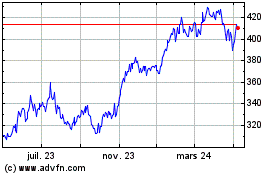Microsoft Steps Up Push to Dominate Hottest Segment of the Cloud
04 Novembre 2019 - 3:29PM
Dow Jones News
By Aaron Tilley
Microsoft Corp. is introducing new tools to accelerate its
campaign to outflank cloud-computing rival Amazon.com Inc. by
targeting big businesses that have balked at shifting their data to
the cloud.
The tools Microsoft is unveiling Monday are aimed at what is
perhaps the hottest part of the multibillion-dollar cloud market,
the so-called "hybrid cloud." Those cloud systems let companies
shift some computing to cloud services while keeping control of
data they need to hold closely.
Cloud computing, whereby customers rent some of their large
computing horsepower rather than investing in their own, has become
a profit driver for Microsoft and Amazon. Microsoft's commercial
cloud revenue has roughly doubled in the last two years to $11.6
billion in the last quarter. The success of Azure, Microsoft's
cloud offering, has helped turn the Redmond, Wash., software giant
into a $1.1 trillion company.
The cloud market overall reached $175.8 billion in sales in
2018, according to Gartner Research Inc.
Much of the early cloud growth was driven by businesses that
hadn't spent heavily on in-house IT departments. Startups easily
moved to the cloud, where Amazon's cloud unit, known as AWS, had
success.
But many of the companies with the biggest IT budgets, such as
those in highly regulated industries like finance, have remained
partially on the sidelines, in part because of regulatory hurdles
that make it difficult for them to store some data on servers
belonging to other companies.
Other companies have been slow to invest in the cloud because of
specific business challenges. Cargo ships and remote oil and gas
extraction sites, for example, can be difficult to connect to the
cloud.
To win business from such customers, cloud services providers
such as Microsoft are expanding into what they call the "hybrid
cloud," a mix of cloud IT systems and data centers owned by
customers, where some of the most sensitive information is stored
and processed.
Amazon was a pioneer in the cloud business. Microsoft has been
playing catch-up, and put more emphasis on the hybrid cloud. "It's
really been a differentiator for us," said Scott Guthrie,
Microsoft's executive vice president running the cloud and
artificial intelligence group.
Microsoft said on Monday that it would expand its Azure cloud
offering aimed specifically at the kind of customers looking to
implement hybrid cloud systems. Microsoft has been offering its
Windows operating system to run on customers' servers for decades.
But two years ago it wanted to expand its businesses and began
allowing customers to run part of its Azure cloud on their in-house
equipment to allow those servers to work seamlessly with the Azure
data centers Microsoft runs.
Now Microsoft is adding new versions of those servers, which it
calls Azure Stack. Among them is a "ruggedized" version, more
robustly constructed to withstand tougher environments to appeal to
military users. Microsoft just won a contract valued up to $10
billion to provide cloud infrastructure to the Pentagon, which is
expected to have hybrid cloud features because some military
information is too sensitive to put into the cloud.
The company is also introducing a system called Azure Arc to let
more of its cloud-based database applications run inside customers'
data centers.
Microsoft isn't alone in its hybrid cloud bet. International
Business Machines Corp. spent around $34 billion to buy
open-systems software company Red Hat Inc. to bolster its hybrid
cloud credentials. "I view this as a defining moment in IBM's cloud
journey," Chief Executive Ginni Rometty said in July when the deal
closed.
IBM, which trails Amazon, Microsoft and others in the total
cloud market, has said it wants to dominate the hybrid cloud era.
IBM has said only 20% of businesses have made their commitment to
cloud services. Arvind Krishna, IBM's senior vice president for the
cloud, has said the hybrid cloud businesses represents a $1.2
trillion business opportunity between hardware and software
products.
Oracle Corp., another company doing extensive business with
corporate IT departments, has said hybrid cloud is a priority and
in October said it was increasing its cloud-computing staff.
Julia White, corporate vice president of Azure, said Microsoft
designed its cloud from the outset with the hybrid model in mind.
"It's been our belief from the beginning that systems would be
distributed," she said in an interview.
Amazon and Alphabet Inc.'s Google, another competitor, have
their own hybrid cloud aspirations, including letting their cloud
technology run on data centers that customers already have. Late
last year, Amazon announced AWS Outposts, a product similar to
Microsoft's Azure Stack servers.
Amazon's move is pushing Microsoft into further investment, said
Erik Vogel, a global vice president of customer experience for
Hewlett Packard Enterprise Co.'s GreenLake service, which works
with clients to manage their hybrid cloud, and partners with big
public cloud vendors such as Microsoft. "We're seeing a renewed
investment and push for the Azure Stack solution," he said.
Write to Aaron Tilley at Aaron.Tilley@wsj.com
(END) Dow Jones Newswires
November 04, 2019 09:14 ET (14:14 GMT)
Copyright (c) 2019 Dow Jones & Company, Inc.
Microsoft (NASDAQ:MSFT)
Graphique Historique de l'Action
De Mar 2024 à Avr 2024

Microsoft (NASDAQ:MSFT)
Graphique Historique de l'Action
De Avr 2023 à Avr 2024
